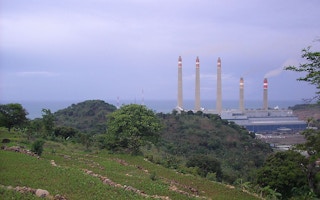After a landslide victory in South Korea’s national elections earlier this year, President Moon Jae-in and his Democratic Party of Korea announced a major plan to tackle climate change.
A package, known as the Green New Deal, aimed to transform what is one of the world’s most dynamic economies: emissions of climate-changing greenhouse gases would be sharply reduced over coming years and totally eliminated by 2050.
There were also promises of big public investments in renewable energy and a commitment to phase out state support for overseas coal projects. Coal is by far the most polluting of fossil fuels.
Moon Jae-in’s administration is now backtracking on many of its green promises.
Environmental groups are particularly concerned by an announcement late last month that South Korea’s largest state-owned electricity company – along with state banks – is investing hundreds of millions of dollars in a coal-fired power plant in Indonesia.
More to come
The Indonesian project – called Java 9 &10 – is at the giant Suralaya plant at Cilegon, near Jakarta.
Under the terms of an agreement reached between the South Korean and Indonesian state authorities, the Korea Electric Power Corporation (Kepco) will invest US$51 million (£40m) in adding two power units to the Cilegon plant.
In addition, South Korea’s state banks will make further investments amounting to more than $1billion, while Kepco will offer loan guarantees.
The Cilegon project is highly controversial: the plant is already one of the main sources of pollution in the densely populated area surrounding Jakarta.
Energy analysts and opponents of the project say that the additional power the plant will provide is not needed. They say enlarging the plant not only runs counter to South Korea government policy but also conflicts with the Indonesian government’s policies on tackling climate change: Jakarta recently announced ambitious plans to dramatically increase the use of solar power.
“Kepco’s decision to continue the Java 9 &10 project in the midst of a pandemic has shown the true face of the South Korean government and proves it is concerned with short-term profits rather than humans and the environment”, said Didit Haryo Wicaksono of Greenpeace Indonesia.
Elsewhere in the region, Kepco is involved in discussions on a multi-million dollar expansion of the coal-fired Vung Tau power plant in Vietnam.
Kepco shareholders have voiced concerns about both the Indonesia and Vietnam projects, saying that worries about pollution might lead to the loss of millions invested.
South Korea is not alone in touting green policies at home while seeking to make money from polluting projects overseas.
China is making efforts to clean up its once notorious urban pollution hot spots. It is the world’s biggest producer and also consumer of coal: many coal-fired enterprises have been shut down or converted to other energy sources.
Green deal undermined?
Yet China continues to promote coal-fired projects overseas. It is building and financing several coal-fired power plants in Pakistan and in the Balkans, as well as supporting the expansion of coal projects in various African countries. Japan is another large financier of overseas coal projects.
South Korea is among the world’s top ten emitters of greenhouse gases, much of the pollution caused by emissions from coal-fired power plants, which generate more than 40 per cent of the country’s electricity.
Under the terms of Seoul’s new green deal it’s planned to phase out the use of coal by 2030. In the aftermath of the Indonesia coal plant deal, there are doubts that South Korea will put a halt to its overseas coal projects.
Jessica Yun of the South Korea climate group Solutions For Our Climate, quoted in the Eco-Business journal, says that if the government refuses to stop financing coal projects, the whole green deal will be undermined. “By not ending public coal financing, Korea’s Green New Deal would not be green at all”, Yun said.
“That would just push dirty air pollution and greenhouse gas emissions abroad – the height of hypocrisy and irresponsibility.”
This story was published with permission from Climate News Network.

















